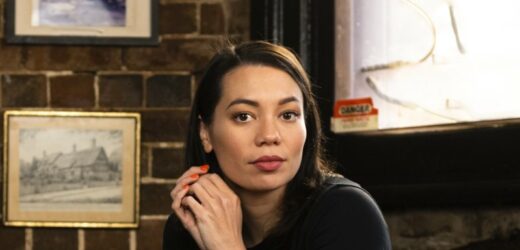Save articles for later
Add articles to your saved list and come back to them any time.
When musical director, multi-instrumentalist, composer, cabaret artist and artistic director Victoria Falconer was growing up, she knew she wanted to star in a musical.
“Musicals seemed the appropriate place for a big show-off who loved playing lots of instruments and singing and titting around generally,” she says. “But it was very rare to see myself represented on stage.”
So rare that Falconer, who has Philippine and British heritage, and is co-artistic director at Sydney’s Hayes Theatre (with Richard Carroll), stopped trying to work in the world of musicals and instead jumped into cabaret and physical theatre.
Hayes Theatre co-artistic director Victoria Falconer couldn’t see a place for herself in musical theatre.Credit: Joe Armao
“I lived in fringe-land,” she says. “I wanted to bring in different influences, play around with form, the kind of stuff you get from having an interesting, diverse childhood and a family of two different cultures.
“Musicals didn’t seem like the place for that. So I went away and lived in fringe-land, which more than welcomes that kind of work.”
Falconer’s work in independent theatre has seen her: win two best cabaret artist awards at the Adelaide Fringe; score a nomination for best musical direction at the Sydney Theatre Awards (for Once); take on the role of musical director on musicals Lizzie and Gentlemen Prefer Blondes; and co-create and host the sold-out Sydney Festival work Smashed – The Brunch Party.
“Now I’m back and it’s exactly what musical theatre wants,” she says. “It feels like even the most mainstream of audiences are interested in not only seeing stories that reflect themselves, but also reflect the other people that they know and love around them.”
That philosophy drives the programming at Hayes Theatre, an independent company that makes new and traditional musical theatre with a vast and diverse array of creative people. Falconer attributes part of that ethos to her background.
“People of colour, creatives of colour, we’ve worked from a place of deficit for so long, that having to find inventive, exciting ways to do stuff means that our work is exciting,” she says.
Falconer was the musical director of Once, which just finished a new season in Melbourne.Credit: Robert Catto
“I know that that’s a huge generalisation. But we work outside of the borders anyway. We have to find ways around the rules to do things. Not just with telling our stories, but with how we actually put them on stage. So play is part of that culture of telling you stories.”
Catherine Van-Davies, co-artistic director at Sydney’s Old Fitz Theatre (with Alexander Berlage and Constantine Costi), agrees. The Vietnamese Australian actor says one of the main tenets of programming at the Old Fitz is “de-centring” ideas of what makes good theatre.
“We need to burst open concepts of what theatre is,” she says. “Encompass many multidisciplinary approaches to it and many makers from different walks of life. That immediately asks the audience to start opening themselves up to receiving stories differently.
“For those from marginalised communities, or historically underrepresented communities, we operate in a constant state of translation with the stories that are provided to us.
“So we become multilingual in an emotional sense, in a cultural sense, in a huge array of ways, and that is an exciting thing to offer to audiences, because they also have the capacity to do the same thing.”
Old Fitz Theatre co-artistic director Catherine Van-Davies wants to offer space for artists to make uncompromising work.Credit: Rhett Wyman
Falconer and Van-Davies are leading some of the most diverse, original and inventive programming in Sydney theatre, from their relatively small independent companies.
They are as passionate about spearheading change as they are about supporting and creating work that upends traditional boundaries in theatre.
Neither dismisses older or conventionally traditional works. Nor do they believe progressive or cutting-edge performance requires a one-size-fits-all approach.
But both, along with their artistic director colleagues, want their theatres, and theatre generally, to burst at the seams with diversity, opportunity and perspectives that break theatre conventions.
“We don’t want to just be mimicking what subsidised theatres can do,” Van-Davies says. “We want to be offering a space in which artists can be true to their vision, without compromise. Enable them to take bold and risky offers, to delve into their practice in a deeper and more experimental way.
“Because of the many costs involved in the larger state theatre companies, they can’t take those kinds of risks.
“We want artists to have a really clear, open voice in our spaces. And that’s naturally going to bring in voices from less represented communities, I think.”
Catherine Van-Davies is also an actor. Earlier this year, she starred opposite Raj Labade in Griffin Theatre’s Sex Magick.Credit: Brett Boardman
At the Old Fitz, overseen by Red Line Productions, the diversity of work has ranged from Chewing Gum Dreams by UK playwright Michaela Coel (I May Destroy You) to New Balance‘s stories of the queer, disabled experience; Cheryn Frost’s experimental work Volcanoes & Vulvas; and Tennessee Williams’ A Streetcar Named Desire, directed by Alexander Berlage and featuring Van-Davies as Stella.
Hayes has recently programmed Lizzie, director Maeve Marsden’s “queer grunge” take on the story of Lizzie Borden, a theatre adaptation of Gentleman Prefer Blondes, new Laura Murphy (Bell Shakespeare’s The Lovers) musical Zombie, and The Lucky Country, with music and lyrics by composer and Six the Musical star Vidya Makan.
Falconer, who was named one of the 40 under 40 most influential Asian-Australians for 2022, for her leadership in arts and culture, is also a founding member of The People of Cabaret, an initiative that advocates for artists of colour.
Falconer and Van-Davies agree programming new theatre, whether fresh takes on old work or experimental pieces with little precedent, doesn’t mean tearing apart the rulebook.
“Using the rules to destabilise a little bit is often enough, because it means that it’s also not too threatening,” Falconer says.
Van-Davies reiterates the need to support artists.
“I want artists to feel uncompromised,” she says. “I want them to feel like they have a place in this world, even if they’ve not seen it reflected back previously.
“Theatre is an ecosystem and I want them to have their voice in it.”
A Streetcar Named Desire is at Old Fitz Theatre until July 1. The Lucky Country is at Hayes Theatre until June 17.
Sydney Morning Herald subscribers can enjoy 2-for-1 tickets* to the Archibald, Wynne and Sulman Prizes exhibition at the Art Gallery of New South Wales during June 2023. Click here for more details.
The Booklist is a weekly newsletter for book lovers from books editor Jason Steger. Get it delivered every Friday.
Most Viewed in Culture
From our partners
Source: Read Full Article






